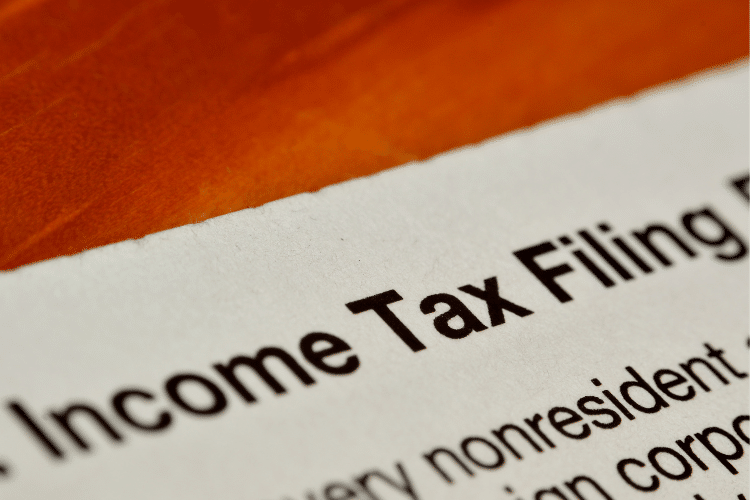Last Updated on May 14, 2025 by Maryam Siddiqui
The breathtaking landscapes, vibrant culture, and warm hospitality can be an enriching and exciting experience. But let’s get real – taxes are part of the deal. As an expat, it’s crucial to understand how to file income taxes in Portugal to fulfill your tax obligations on time.
Whether you’re working, running a business, or receiving income from investments or rental properties, filing your taxes accurately and before the deadline is crucial. Navigating the Portuguese tax system can be complex, especially if you need to familiarise yourself with the local laws and procedures.
But, by familiarising yourself with the basics of filing taxes, you can ensure compliance with the law and make the process more manageable. Remember, you’re not alone; seek guidance where and when needed. Stick around to know all about income taxes in Portugal!

Income tax in Portugal
When it comes to personal income tax in Portugal, there are a few things every savvy expat needs to know. First and foremost, as a legal resident in Portugal, you’ll be subject to the same personal income tax rules as Portuguese residents. This means you’ll need to report your worldwide income, including income earned in Portugal and abroad – no exceptions.
But the government isn’t here to take away all your earnings. The state offers attractive tax incentives that will make sure more money stays in your wallet.
One of the ways expats have been able to save money on taxes has been the Non-Habitual Resident (NHR) regime, which has since been changed to IFICI regime.
Through this regime, eligible expats can enjoy a flat tax rate of 20% on qualifying foreign income for ten years! Imagine a decade of savings you didn’t think you’d be keeping aside! What’s more, under the IFICI regime, income earned from foreign sources—like dividends, royalties, and rental earnings—is exempt from taxation.
Let’s also not forget that Portugal has tax treaties with many countries to avoid double taxation. These agreements ensure you don’t end up in a tricky situation where you’re paying taxes on the same income in Portugal and your home country.
During the first few years of your stay, and also prior to your relocation, you will have to deal with a lot of complicated bureaucracy. To avoid mishaps, hire an experienced accountant from Viv Europe to help you with how to file your income taxes in Portugal.
Who pays income tax in Portugal?
Let’s get a few things straight before you learn how to file personal income taxes in Portugal. The first step is knowing who has to pay income taxes. Let’s define the two categories for you:
- Residents: If you live in Portugal for more than 183 days or have a permanent home there, you are a tax resident. You must report and pay taxes on your worldwide income as a resident. This includes income earned in Portugal and abroad.
- Non-residents: If you live in the country for less than 183 days and don’t have a permanent home, you are a non-resident. Non-residents are only taxed on their income derived from Portuguese sources. These sources are employment, business activities, or rental income from properties in the country.
Whether you’re a resident or a non-resident, understanding your tax obligations and filing your income taxes accurately and on time will help you stay compliant with Portuguese tax regulations.
- Read Also: Portugal Tax System: Easy Breakdown For Expats.
Who doesn’t have to pay income tax in Portugal?
While residents and non-residents have to file income tax in Portugal, a few groups of individuals may be exempt from such duties. But there’s a proper structure for those that benefit from this exemption.
First up, we have the Incentivo Fiscal à Captação de Investimento beneficiaries! The qualifying individuals enjoy a flat rate of 20% on foreign income for up to ten years. Also, all foreign sourced income apart from pension is not taxed as well.
Other than that, individuals whose annual income falls below the minimum threshold the government sets may be exempt from personal income tax. However, remember that this threshold can be a bit of a moving target, and the Portuguese Tax Authority has the final say.
Lastly, diplomatic staff and employees of foreign governments stationed in Portugal may be exempt from income tax on their official salaries.
Stay well-informed and follow all protocols to keep enjoying a beautiful life in Portugal!

Which earnings are subject to income tax in Portugal?
Next up, you need to know the kinds of earnings that are taxed. There are a few different kinds, so we’ve compiled a list for your ease. Here are the types that are subject to taxation in Portugal:
- Employment Income: This includes salaries, wages, bonuses, and any other benefits received as compensation for employment. If you’re a resident, this income gets taxed not only for the work you do in Portugal but also for any earnings you make abroad.
- Self-Employment and Business Income: The income you generate from your self-employed activities if you work as a freelancer or run a business. This includes income from professional services, consulting, freelance work, and other entrepreneurial activities.
- Pension and Social Security Income.
- Investment Income: Income generated from any type of monetary investment. For example, dividends, interest, capital gains, and rental income from investments. Also, check details for the minimal tax on crypto, which is one of the Top 7 Reasons Why Cryptocurrency Investors Are Moving To Portugal.
- Rental Income: The rental income you receive if you own and rent out properties. This includes income from residential and commercial spaces and short-term rentals.
How to file your tax return in Portugal
Now that you have all the basic knowledge pertaining to income tax, let’s dive into how to file income taxes in Portugal. Don’t worry, we’ve termed things as simply as we could, and we’re here to answer your questions wherever needed.
Filing your tax return in Portugal is a straightforward process. First things first – gather the essential documents to get started. Here’s a list:
- Personal Identification (Passport or Portuguese ID card);
- Your tax identification number (NIF Number);
- Income statements (employment, rental, investment);
- Any relevant deductions or expense receipts.
After that’s done, it’s time to fill in the tax return form. You can find the official tax return form Modelo 3 on the Portuguese Tax Authority’s official website. Take your time during this process because you must fill it thoughtfully, according to the best of your knowledge.
At this stage, it’s important that you mention your income, deductions, and other required information accurately. And some expats may need additional forms for social security contributions.
It’s time to embrace the digital era! Yes, Portugal is heavily bureaucratic, but you can also electronically submit your completed tax return via Portal das Finanças, the online platform of the Portuguese Tax Authority. Just remember to use your digital signature or electronic certificate for authentication.
Last but not least, to know how to file income taxes in Portugal completely, you must also know about payments or refunds. If you owe taxes, pay by the deadline, which we will talk about in a bit. And if you’re entitled to a refund, provide your bank account details to the Portuguese tax authority to process a refund. There’s nothing more to it.
Let’s Move to Europe
With Viv Europe your plans for Europe will come to a reality
Income tax deadlines and forms
At this stage, you’ve dotted all the I’s and crossed all the T’s; good job! Now, to make the payments on time. Tax deadlines change every year, so it’s very important to be in contact with a professional to file your taxes on time.
For 2024, here are a few important dates to remember for income taxes and property taxes:
- 26th February: End date to verify your invoices on the Tax Authority Website.
- 1st April: End date to claim invoices for general and household expenses.
- 31st May: First property tax (IMI) installment due.
- 30th June: Last day to hand in personal income (IRS) statement.
- 31st August: Second property tax (IMI) installment due (for tax amounts higher than €500).
- 30th November: Second property tax (IMI) installment due (for tax amounts lower than €500).
- 30th November: Third property tax (IMI) installment due (for tax amounts higher than €500).
The payment of income tax in Portugal usually must be made by August 31st. This date is followed if the assessment of the amount owed or to be received has been finalized by July 31st.
But if the assessment is completed by November 30th, the payment deadline is extended to December 31st. You must ensure that any tax liabilities are settled within these specified deadlines to fulfill your tax obligations in Portugal.
Secondly, as mentioned earlier, the main tax form for filing income taxes in Portugal is the Modelo 3. But expats may need to complete supplementary forms such as the Anexo SS for social security contributions or the Anexo J for foreign-source income. Keeping track of these deadlines and using the correct forms will help ensure a smooth tax filing process.
- Can’t make sense of these forms and guidelines? Viv Europe is at your service! Get clarity and file your taxes on time!
Income tax rates in Portugal
Understanding the income tax rates is an essential aspect of taxation. Here’s the deal – Portugal follows a progressive tax system, meaning the tax rates increase as your income rises. This establishes a fair contribution by society and makes sure everyone contributes based on their ability.
Take a look at the progressive tax rates to get estimates:
- Income up to €7,703 13.25%
- Income from €7,703 to €11,623: 18%
- Income from €11,623 to €16,472: 23%
- Income from €16,472 to €21,321: 26%
- Income from €21,321 to €27,146: 32.75%
- Income from €27,146 to €39,791: 37.0%
- Income from €39,791 to €51,997: 43.5%
- Income from €51,997 to €81,199: 45.0%
- Income above €81,199: 48.0%
These rates are as of February 2024.
It’s important to note that these rates may change, so it’s advisable to consult the Portuguese Tax Authority or an experienced accountant to obtain the most up-to-date information on tax rates and how to file income taxes in Portugal.
Additional Information About Taxation For Expats Under The NHR 2.0
Your tax rate in Portugal really depends on two things: whether you’re on the standard tax system or under the new IFICI (NHR 2.0) regime, and what kind of income you’re earning. If you’re eligible for IFICI and your income comes from high-value work in Portugal, you could enjoy a flat 20% tax rate.
But if your income doesn’t qualify—or you’re not under IFICI—you’ll fall under the regular progressive tax brackets, which go up as your earnings increase. So, it’s all about what you earn and how it fits into the regime.
Portugal’s income tax for foreigners
Time to dive into the intriguing world of income tax for foreigners in Portugal. At the beginning of the article, we discussed how non-residents are taxed on their income from Portuguese sources, such as employment or rental income.
But Portugal offers a silver lining for expats who can benefit from tax incentives under the new NHR 2.0 and double taxation treaties! Continue reading to learn about the details of each scheme.

How To Qualify For IFICI (NHR 2.0)
Throughout the article, you would have noticed the Non-Habitual Resident Regime’s flat tax rate being talked about. Apart from the regime’s mentioned benefit, it offered expats substantial tax savings. The flat tax rate applies to foreign income, including pensions, dividends, royalties, and professional income.
To qualify for IFICI, individuals must be a tax resident in Portugal. This means you spend at least 183 days in the country or own a house that suggests an intention to reside.
Other than being a tax resident, eligibility is strongly tied to your profession or type of business. NHR 2.0 focuses heavily on attracting skilled professionals and businesses that are geared toward international markets.
The following steps will help you to apply for NHR 2.0:
1. Register as a Tax Resident
Start by obtaining a Portuguese Tax Identification Number (NIF) and registering as a tax resident with the Portuguese Tax Authority (Autoridade Tributária – AT).
2. Verify Your Eligibility for IFICI
To qualify, you must not have been a tax resident in Portugal in the five years prior to your application. Additionally, your profession must fall under the list of eligible high-value activities recognized by the Portuguese government.
3. Prepare the Required Documentation
Gather the necessary paperwork to support your application. Such documents may include:
- Proof of non-residency in Portugal for the past five years
- Evidence of employment or self-employment in a qualifying profession
- Relevant academic or professional qualifications
4. Submit Your IFICI Application
Apply through the Portuguese tax portal (Portal das Finanças) or through authorized agencies such as AICEP or IAPMEI, depending on the nature of your professional activity.
5. Await Approval
Once submitted, the Portuguese Tax Authority will review your application and confirm whether you meet the eligibility criteria for the IFICI regime.
Take a look at our article Portugal NHR Regime 2.0: IFICI – Tax Benefits In 2025. Get in touch with our experts to get professional advice!
Double Taxation Treaties
Double taxation treaties are crucial in avoiding taxing expats twice on the same income. You really don’t want to be taxed twice. Portugal is one of the many countries that have signed double taxation treaties with other countries worldwide.
These treaties prevent double taxation by determining the taxing rights between Portugal and the other country. They provide mechanisms to exempt or credit taxes paid in one country against taxes owed in another.
You should check the treaty between Portugal and your home country to understand the available provisions and benefits. Again, seeking advice from a tax professional might be a good idea to navigate the complexities of double taxation treaties.
Personal tax deductions and allowances in Portugal
If you want to master the art of filing income taxes in Portugal, you have to understand those sneaky tax deductions proficiently.
For example, you can deduct medical expenses like doctor visits, prescriptions, and hospital bills. Keep a watchful eye on the numbers because you can only claim deductions if your medical expenses exceed a certain percentage of your household’s total income. A tip is to keep detailed records of all relevant medical costs, including receipts and invoices.
When it comes to deductions, paperwork is your best friend. You must file your tax return with supporting documents to apply for a tax deduction. The supporting documents list is available on the official website. Also, education-related costs like tuition fees and educational materials can be deducted.
If you’re an expat retiree, you can use pension contributions to avail tax deductions for contributions to a pension plan. There’s more; if you own a house, the country offers deductions for mortgage interest paid on a primary residence in real estate.
Your overall tax burden will be reduced as the interest paid during the tax year will be deducted from your taxable income. But remember to keep records of mortgage interest payments to avail of this deduction.
Portugal also provides tax credits and deductions for dependents, such as children or elderly family members, under family allowances.
Tax refunds in Portugal
You may be entitled to a tax refund if you have overpaid taxes or are eligible for tax credits. The refund process involves providing your bank account details on your tax return. Once your tax return is processed and the refund is approved, the funds will be transferred directly to your bank account.
Ensuring accurate and timely tax return filing is vital to accelerate the refund process. You can visit the Portuguese Tax Authority or consult an expert from Viv Europe for specific guidance on tax refunds for expats.
Tax fines in Portugal
Here are some important rules to keep in mind at all costs.
Remember to fulfill your tax obligations to avoid fines for late filing and payment. Fines can also be charged for providing incorrect information on tax returns. Moreover, fines vary on the offense, ranging from fixed amounts to a percentage of the tax owed.
Fines also vary based on how late you are. If it’s just a few days, the fine will be smaller. If weeks or months pass by, the amount will be much larger.
Do you need tax advice in Portugal?
Now that you know how to file income taxes in Portugal, tax complexities will no longer stand between you and your new home! It’s okay to still not be proficient in these matters; it takes time to adjust to new laws.
Expats like you are our usual clients here at Viv Europe. To get your tax matters sorted or just ask for more clarity, book a consultation with our experts and get the help you need!
For updates and expats’ stories, join our Facebook Group – All About Portugal For Expats, and learn more about the country. Ask questions and read others’ stories to keep it fun. Let’s start working to make your dream come true!








